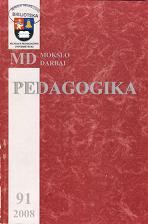Neformaliojo mokymosi modelio įtaka andragogų praktikų kompetencijų kitimui
Development of the Competencies of Andragog Practitioner Through Non- Formal Learning Model
Author(s): Aurimas Marijus JuozaitisSubject(s): Education
Published by: Vytauto Didžiojo Universitetas
Keywords: andragog (adult educator) practitioner; competencies; competencies of andragog; assessment
Summary/Abstract: The article deals with the development of the competencies of adult educator (andragog) through the proposed nonformal learning model. The model itself is based upon 12 competencies of andragog which were proposed by juozaitis (2007). The model has four parts. The first part is as-signed to participants' self-assessment of competencies before start of the model events. The assessment is made by questionnaire which compilation based upon behavior scheme what means that each of competence is described by 4 behaviors. After self-assessment the second element of the model is tried out - training of 64 learning hours. The event is divided at least into two sessions after each the homework is allocated. The homework is presented at the next session and feedback on the work done is presented by the course leader and from learners group. The third model event is practice. At least 40 hours of practical try-out is allocated for each participant of the model. She / he should practice teaching / learning methods and principles of training program compilation with their learners. The fourth model event is assessment for which is allocated 16 hours (for analysis of personal learning during the model and assessment procedure). First of all, the questionnaire on competencies fulfilled in the form of 360°feedback (it is compiled by participant, her / his employer, colleague and at least 2 learners). The second step in assessment is conversation with the experts at which professional portfolio and self analysis are presented. From january, 2006 through april 2007 174 adult educators-practitioners have participated in the model. Effectiveness of the model was evaluated by comparison of questionnaire self-assessment results compiled by participants before the model and at the end of it. An average growth of the assessment score (maximum of assessment is 8) is approx. 1 point, standard deviation at the end of the model is les s than at the beginning and it could mean the more exact estimation of competence value. An overall conclusion of the results could be made such - the model could be applied for the development of andragog-practitioner competencies. As the biggest change in scor-ing was observed in competencies linked with skills development and the least with scoring of knowledge development competencies - there could be concluded that proposed model is more suitable for development of practical skills among the participants of the model rather than knowledge and understanding of adult education fostering among them.
Journal: Pedagogika
- Issue Year: 2008
- Issue No: 91
- Page Range: 136-144
- Page Count: 9
- Language: Lithuanian

